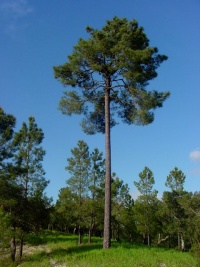Pine Bark
From Wikiwel
Other Names : Pinus pinaster, Pinus maritima, Maritime pine, cluster pine, pinheiro bravo, pi maritim, pi pinastre, pino maritimo, pino resinero, pino rodeno, Pycnogenol ®
See also :
Special Precautions of Pine Bark
- Toxicology studies show that there is no danger of toxicity from maritime pine bark when used in normal dosages. However the bark extract is very concentrated and should never be taken above the recommended dose levels. Toxicology studies show that acute toxicity may occur in a 75 kg adult male at a dose level of approximately 336,000 mg or more than 250 times the recommended dose. Some people report mild problems such as headache, nausea, and upset stomach. Pine bark extract is not recommended for pregnant or breast-feeding women, due to lack of scientific evidence for its safety.
- Maritime pine bark may lower blood sugar levels. Blood glucose levels may require monitoring, and doses may need adjustment. Patients taking drugs for diabetes should be monitored closely by a qualified healthcare provider. In theory, maritime pine bark may interact with medications, herbs and supplements that affect blood pressure; caution is advised. Maritime pine bark may increase the risk of bleeding when taken with anti-inflammatory medications, herbs and supplements, or any medications, herbs or supplements that are believed to increase the risk of bleeding. Multiple cases of bleeding have been reported with the use of ginkgo biloba, and fewer cases with garlic and saw palmetto. Maritime pine bark may interfere with immunosuppressant or immunostimulant herbs and supplements.
The benefits of Pine Bark are
Recent studies indicate that maritime pine bark may be an effective herbal treatment for symptoms of illnesses such as diabetes, arthritis and viral diseases.
- Pycnogenol ® is the patented trademark name for any group of flavonoids extracted from the bark of French maritime pine trees. Maritime pine bark extract is available in more than 600 dietary supplements, multi-vitamins and health products worldwide.
- may help improve symptoms associated with chronic venous insufficiency (CVI), a syndrome that includes leg swelling, varicose veins, pain, itching, skin changes and skin ulcers.
- Skin care : Boils, cuts, fleas, insect repellent, lice, ringworm, scabies, wounds
- may be effective in treatment and prevention of retinopathy and retinal micro-hemorrhages, including slowing the progression of retinopathy in diabetics.
- Respiratory system : Bronchitis, catarrh, whooping cough
- Genito-urinary system : Cystitis, leucorrhoea, urethritis
- Immune system : Cold
- for allergies and inflammations such as allergic reactions and hay fever.
- Circulation, muscles and joints : Arthritis, gout, muscular aches and pains, rheumatism, sciatica
- may be useful as an herbal treatment for heart disease by reducing cholesterol deposition and some studies have shown that maritime pine bark extract could have positive results in treatment of heart disease through the antioxidant effect of reducing the adhesiveness of platelets and reducing blood clotting.
- Maritime pine bark may be helpful in cancer prevention and treatment, as some research indicates that he antioxidant properties of maritime pine bark may help protect against carcinogens and free radical damage to DNA.
- Bioflavinoids present in maritime pine bark are believed to help maintain the health of brain cells and facilitate oxygen uptake to improve memory which might make it useful in treating Alzheimer’s disease (AD).
- Nervous System : Neuralgia, fatigue and anxiety
- It has been used as an herbal treatment of symptoms of menstrual cramps and constipation
